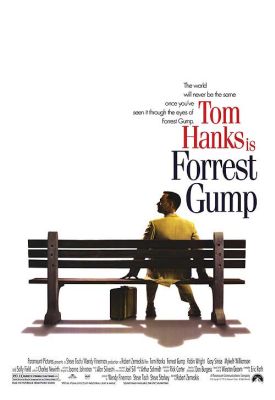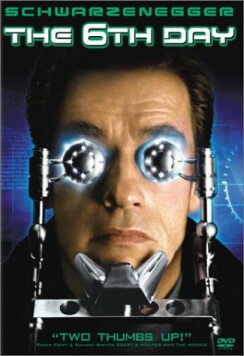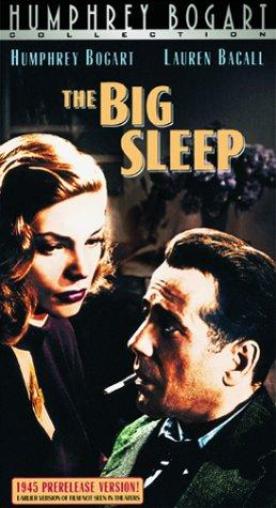Forrest Gump
Robert Zemeckis’s Forrest Gump is one of those precious, self- conscious films that tries so hard to be heart-warming that it ultimately gives you heartburn. Candide, or perhaps Huckleberry Finn, meets Woody Allen’s Zelig in the title character, and it makes for a disconcerting mix. But this is not really a satire, as you might expect. The Candide in this case is the eponymous Gump, played by Tom Hanks, who has an IQ of 75 but a heart of gold and legs of steel (Gary Sinese as his beloved “Lieutenant Dan” in Vietnam ends up with legs of titanium) and, perhaps, other artificial parts. He also has a preternatural skill at ping pong. The point of him is, very occasionally, to make us look at things with an innocent eye, but mostly, I think, it is to try to get round the problem of presenting goodness in the movies of the hip, cynical, knowing postmodern era. The only way it can be done is to make the good person an idiot.
“Most of the Forrest Gump filmmakers are baby boomers who seem happy to have found a nonpolitical way to sentimentalize the events of their own lives,” wrote Julie Salamon in the Wall Street Journal — sentimentality being, I suppose, another of Hollywood’s lo-cal substitutes for goodness. But it is not quite true that the film is non-political. For Forrest is also, like his fellow Vietnam vets, a victim — in his case, a victim of nature as well as of the war — though one who ultimately triumphs over circumstance and remains both patriotic and resentful of the anti-war protestors, among whom Forrest’s sometime sweetheart, Jenny (Robin Wright Penn), has fallen. Of course, victimhood, is another simulacrum of goodness that plays well in Hollywood — not to mention in the received media version of the Vietnam War.
The movie’s popularity may also have something to do with its use of special effects, something in which Mr. Zemeckis is by way of being a specialist, since he also did Who Framed Roger Rabbit. Here, he contrives to insert images of Mr Hanks as the couthless Forrest into filmclips of various historic moments, including meetings with President Kennedy (when he is an all-American running back for the Alabama Crimson Tide), President Johnson (when he wins the medal of honor in Vietnam), President Nixon (when he plays ping pong for the US against China) and John Lennon (on the “Dick Cavett Show”). The other great bit of special effects is to portray Gary Sinese as a very convincing double amputee. Mr Zemeckis’s wizardry is able to show us the stumps of his legs with, apparently, nothing but air beneath them. Yet, we are assured, Mr Sinese still has all the parts that God gave him.
Having audiences ask: “How do they do that?” is presumably the goal of this kind of filmmaking, which doesn’t really know what to do with its human material after it has put it through the special effects mill. It is crass, really, to have made Forrest not only good but also materially successful — a rich man, in fact — by dumb luck, mostly. Goodness is not its own reward anymore, which is the tribute the film pays, perhaps, to postmodernism. Goodness consorts not only with wealth but with fame, and Forrest is shown as the one who taught Elvis how to move on stage as well as the one who invented the expression “S*** Happens” and the smiley face. There’s a claim to fame for you! He also turns out to be the one who alerted security to the Watergate break-in and other similarly small but key parts in history, for which history has not credited him.
Sally Fields as Forrest’s mother is credited with the banality that Forrest ever after quotes as wisdom: “Life is like a box of chocolates; you never know what you’re going to get.” I would have thought that you know what you’re going to get with a lot more certainty in a box of chocolates than in most things you can name. The box even comes, usually, with a little map to tell you what you are going to get. On the evidence of the film itself, she would have done better to have said that life is like a shrimp net, since you never know what, besides shrimp, it is going to dredge up. Certainly there are a lot of things besides shrimp that Forrest dredges up during his lucrative spell as a shrimp boat captain. Mrs G. also sleeps with a school board member to get poor, educationally sub-normal Forrest into a normal school. “Your momma sure does care about your schooling, son,” says the man on his way out of the house. Young Forrest (Michael Conner Humphreys) makes love-making noises back at him.
Ironically, just about, it is Forrest’s pathetic girlfriend, Jenny, who is the one who “wants to be famous” which to her, in the early 1960s, means being “a singer like Joan Baez” — someone who can sit out in front of people with a guitar and “reach people on a personal level.” It is a cliché to make her a victim of childhood abuse but a good joke to have her dream come true in a strip joint in Memphis as she sits in front of an audience with a guitar but without any clothes on. She sings “Blowing in the Wind.” Serve her right, too, say I. Her involvement with anti-war protests while Forrest goes to Vietnam is just another excuse for a wallow in the ambiance of the period, and the film fudges the issue of Vietnam itself. When Forrest finds himself, by a characteristic accident, addressing a huge anti-war demonstration on the Mall in Washington (another clever bit of special effects), a military saboteur pulls the cords out of the P.A. system so we cannot hear what it is he says to the gathering. Nothing that we see anywhere else in the film would lead us to expect it to be anything very interesting, but then, too, the film’s huge popularity suggests that no one cares anyway.
Discover more from James Bowman
Subscribe to get the latest posts to your email.








